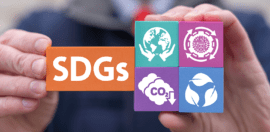New European legislation will require 50,000 EU firms to follow mandatory sustainability reporting standards

12 May 2021 at 4:17 pm
“Ultimately, sustainable investment is about making the right choices. And to make the right choices, you need good information”
A proposed Corporate Sustainability Reporting Directive (CSRD) is expected to come into force in 2024, requiring all large European companies and all listed SMEs to report on their sustainability performance.
Under the CSRD— which will replace Europe’s Non-Financial Reporting Directive (NFRD), which was introduced in 2014 and affects 11,000 companies— more than four times as many firms will be subject to the new rules.
The idea behind the directive is to bring sustainability reporting on par with financial reporting, meaning that any reported information will have to be audited by a third party. This increase in transparency is to assist in moving the flow of any capital towards sustainable investments.
The CSRD was put forward by the European Commission amid calls for government intervention and regulation on global impact investing.
When discussing the CSRD at last week’s European High Level Conference, Mairead McGuinness, commissioner for financial services and former vice-president of the European Parliament, said that sustainable investment was about making the right choices. The way to do that is to have good information.
“We need complete, comparable and reliable sustainability information about companies because the opposite is poor and incomplete information. And this could create systemic risks for our financial system,” McGuinness said.
She added that current rules were unclear and incoherent, which was leading companies to “pick and mix” which standards they wanted to report against.
What does it mean for Australia?
Currently, the CSRD is aimed at countries in the EU, however, McGuinness said she felt it was likely to have an impact beyond European borders.
“While we cannot impose our standards on others outside, I think you will see that others will look towards what the European Union is doing, and therefore follow us rather than it being a requirement,” she said.
She added that it was likely non-EU companies that supply EU entities or work within the European Union may come under pressure to supply sustainability information.
There is currently no worldwide agreement on corporate sustainability reporting standards.
McGuinness said the EU supported global alignment, but clarified that this would not prevent it from exceeding international standards, which should be seen “as a floor, but not a roof”.







